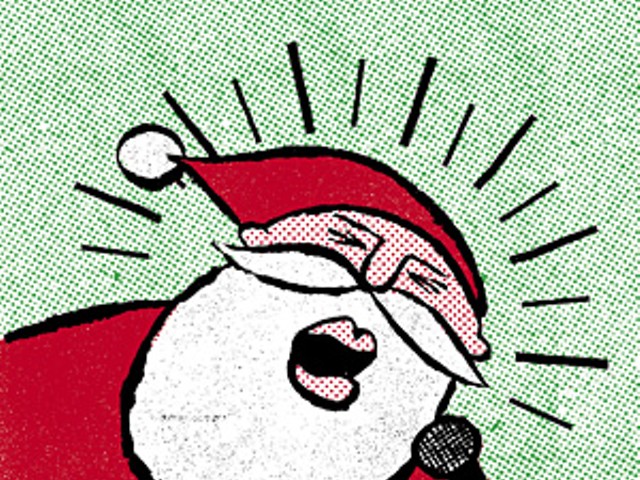The new album from the Blind Boys of Alabama, Down In New Orleans, opens with a quick flourish on a Hammond B-3 organ and a stuttering second-line groove. The rest of the album sounds like nothing the legendary gospel group has recorded before. Anchored by James Carter's rasping tenor wail, the sound is free and frolicking enough that you can almost believe the Crescent City has been fully reborn. That's always been the power of the Blind Boys of Alabama, the most successful gospel group in the world: Clarence Fountain (not currently touring for health reasons), Ben Moore, Bishop Billy Bowers, Ricky McKinnie and Carter can make even the most cynical, secular listener believe in mysteries that defy explanation or understanding, but which can be felt all the same.
The group's current tour brings them to town for two nights with the Saint Louis Symphony Orchestra — expect a lot of seasonal tunes and enough vocal fireworks to keep even the sharpest string section on its toes. B-Sides reached Carter on the band's tour bus and got all the good news.
B-Sides: You've been friends with Clarence since 1939. Do you remember what your first public performance was like?
James Carter: Well, we hit the road in 1944. The first public performance was a radio broadcast in Birmingham, Alabama. We were all kind of nervous because we'd never been on the radio before, not like that. But it worked out OK. After we left there, we did churches, schools and auditoriums.
When did you first feel a response from the audience?
When we started out, we were singing to predominantly black audiences. And they'd grown up with gospel, so they had no trouble with that. They love us. When years passed on, we got a break and got into the mainstream. We sing now to everybody. The white audiences, we found out, they wanted us all the time. We just weren't allowed to get it to them.
Has your friendship with Clarence changed over the years?
That friendship has remained the same. We grew up together, came up together, we're still just like family. We fall out, but we always make up again.
Who was your earliest role model as a singer?
There was a quartet called the Golden Gate Quartet. They were our influence. We always listened to their syndicated radio broadcast. They came on every day and we listened to them. That's where we got our aspirations from.
The Blind Boys have become known for drawing on non-traditional material, but giving it a spiritual feel.
Let me say this: We sing traditional gospel music. However, you have to be able to please everybody. So we do contemporary stuff. We don't particularly like that, but that is the way it is. Some people like contemporary. We are trying to get more people involved in our music. We work with people like Aaron Neville and Ben Harper, because they relate to young people. Now, at our concerts, we probably have more young people in the audience than older folks.
So if you had your choice, you'd do more traditional numbers?
That is correct. We do it all and we love it. We don't have no complaints about it.
I sometimes hear younger musicians — you know, kids in their fifties — describe how difficult the road can be. But you've been on it for going on 60 years.
It can be difficult, but when you've been doing it as long as I have, you accept whatever comes. But that's just the way it is. You adjust to whatever situations come.
You recorded the new record down in New Orleans, with quite a lineup of musicians.
We had the New Orleans flavor, the jazz stuff. We'd never done that before. It was unique, but when we heard the mixes, I think it's going to be a good record. Unfortunately, Katrina was a bad thing that happened but they're making a comeback. We were trying to give people hope. No matter how bad it is, there's always hope.
The set list is based on pretty familiar tunes. Did you choose them all?
Our producer chose most of them, but we okayed them all. That song, "Make a Better World," I'd never heard that before. But "Down By the Riverside" and "I'll Fly Away," those are traditional, and we've been singing them all our lives.
Was it a challenge playing with musicians like Allen Toussaint or the Preservation Hall Jazz Band?
Well, it was different — but I think we challenged them, too!
7:30 p.m. Thursday, December 13 and Friday, December 14. Powell Symphony Hall, 718 North Grand Boulevard. $20 to $65. 314-534-1700.
THE DOWNLOAD
It's the season for giving, and we'll be the first to say it: Those bell ringers need to step up their game. The kind folks at Waxploitation Records sure are with Causes 1, a charity album whose proceeds go toward providing relief in Darfur. The collection of exclusive tracks is available on iTunes until February and features indie favorites like the Shins, Spoon, Animal Collective and the Black Keys. Help yourself to Bright Eyes' contribution for free at Toolshed.biz, or show some holiday spirit and shell out for the whole thing. As an added bonus, you're entitled to a smug sense of superiority, free of charge. (Visit www.toolshed.biz and www.itunes.com.)
Some things are best in small doses — including synth-laden dance punk — which may be why Professor Murder sticks to EPs rather than full-length albums. Despite the critical acclaim that followed last year's five-track debut, the NYC quartet has opted to give away Professor Murder on a Desert Island. You can find the opener, "Flex-It Formula," along with the rest of the EP in upcoming months, at RCRDLBL.com, a new ad-supported (and label-approved) blog looking to get into the free music business. Sounds like a great idea — as long as they remember that online ads are also best in small doses. (See www.rcrdlbl.com)





